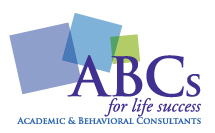Educational Testing /Assessments / Evaluations

Diagnostic testing and academic evaluations provide crucial information about the reasons a child is struggling in school, as well as keys to developing an academic plan that nurtures the child's strengths and removes obstacles to success. ABCs for Life Success, LLC will administer, analyze and review the child's evaluations, reports, testing and history to determine whether a disability exists, and the extent and nature of disability as it relates to education. We administer and interpret results from a myriad of evaluations that test academic achievement (reading, writing, mathematics), auditory and visual processing, attention deficiencies, and more. Our consultants utilize test results and analyses, along with other pertinent information and observations, to determine progress over time, make recommendations for educational services and placement, and make instructional recommendations.
What is the benefit of having an educational evaluation completed?
Information gained from the educational evaluation process assists a child's multidisciplinary team with determining current level of performance, performance in relation to curriculum expectations, student growth over time, appropriate accommodations and modifications, and appropriate academic goals.
What does an educational evaluation entail?
An educational evaluation is crafted to meet the needs of the individual student. Generally, the examiner will review a student's file, speak with current teachers and caregivers, look at work samples and administer academic subtests (reading, writing, mathematics). The examiner will administer additional academic testing as needed to provide a thorough analysis of students' performance, especially in demonstrated areas of weakness. Informal and formal evaluations are components of the process. Progress monitoring is available to determine student's progress on curriculum and goals from the Individual Education Plan (IEP). Report components vary depending on the purpose of the evaluation and a child's situation.
A sampling of standardized tests and assessments by area (not complete list):
Academic Achievement: Wechsler Individual Achievement Test- third edition (WIAT III), Woodcock-Johnson III- Tests of Academic Achievement -Normative Update (WJ-III)
Reading: Comprehensive Test of Phonological Processing (CTOPP), Gray Oral Reading Tests 4 (Gort-4), Gray Silent Reading Tests (GSRT), Informal Reading Inventory
Adaptive Behavior: Vineland Adaptive Behavior Scales, Second Edition (Vineland-II)
Writing: Test of Written Language 4 (TOWL-4), Oral and Written Language Scales (OWLS)
When is a functional behavior assessment appropriate and how does it differ from other types of assessments?
If the child's behavior is interfering with his or her ability to access instruction, a functional behavior assessment, or FBA, should be considered as part of the IEP process. The FBA is not an individually administered test, but rather a data-collection activity performed by members of the multidisciplinary team (MDT). The purposes of the FBA include to: define how serious the behavior is and how it affects learning; quantify with data how long the behavior lasts, when it occurs, and under what condition it occurs; find out what sustains the behavior; discover why the behavior is occurring; and inform the development of the intervention or instruction. (source: School Success for Kids with Emotional and Behavioral Disorders, by Davis, Culotta, Levine & Rice, p. 130-131).
Will the examiner interact with my child's IEP team?
The examiner will work collaboratively with the multidisciplinary team (e.g., attend meetings, phone conversation) to help integrate evaluation results and recommendations into the school program.
Will the report prescribe or recommend specific areas and goals to be addressed in my child's academic program?
The report can include specific areas and goals tailored for the individual student.
Will my child have a formal diagnosis after this testing?
This testing is for diagnostic purposes and does not provide a formal disability diagnosis. The information provided can be one component that is considered by a multidisciplinary team when determining whether a student qualifies as having a disability.
Please contact our Assessment Division for more information about the appropriate diagnostic testing and academic evaluations for your child.








